
Good protection against ticks is essential in the summer months. Because the arachnids can transmit diseases. A new type of virus has now also been detected in Lower Saxony.
Discovered six years ago in China, Alongshan virus (ALSV) is also common in European ticks. The virus has now been found in ticks in Finland, France, Russia and Switzerland, according to the Düsseldorf-based Center for Travel Medicine (CRM). There is also initial evidence in Germany.
Researchers at the University of Veterinary Medicine (Tiho) Hanover found evidence of the transmission of ALSV via ticks to wild animals in Lower Saxony. They published their study in the journal Microorganisms.
The most common tick-borne disease is Lyme disease
“The distribution areas of many native tick species have expanded significantly in recent years,” said the scientific director of the CRM, Tomas Jelinek. The mild winters and warmer summers would benefit the arachnids.
The most common tick-borne disease in Germany is Lyme disease, against which antibiotics help in the early stages. In addition, tick-borne encephalitis (TBE) is particularly common in the south and south-west; there is a vaccination against them.
Serious illnesses that go beyond flu-like symptoms have not yet been associated with an ALSV infection, the Center for Travel Medicine said. However, with the Alongshan virus, the list of pathogens spread via tick bites has grown again.
In a systematic study of ticks collected in Switzerland in 2021 and 2022, ALSV was found even more frequently than the TBE virus. A study from Finland also found ALS viruses in ticks in 2019, but no corresponding diseases in humans.
Further investigations necessary
According to the team at the University of Veterinary Medicine Hanover, further investigations are necessary to assess the potential risk of ALSV to human and animal health.
The Lower Saxony State Office for Consumer Protection and Food Safety (Laves) provided the Tiho scientists with blood samples from wild animals from the 2017 to 2019 hunting season. Among them, a sample from a red deer from the Lower Saxony state forests was positive for ALSV, and ALSV-specific antibodies were also discovered in other wild and domestic animals. The novel virus was also detected in the bodies and saliva of ticks collected from multiple sites.
Read more on Techzle\.com:
- Representative Poll: Support “True Prices” at Penny?
- Schokobons: Ferrero dispenses with insect ingredients
- Coffee grounds help against aphids: But there is one exception